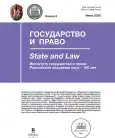ANALYSIS OF ARGUMENTATIVE DISPUTES ON THE CHARACTERISTICS OF A CHALLENGED REGULATION IN CONSTITUTIONAL JUSTICE
- Authors: Chirninov A.M.1
-
Affiliations:
- Institute of Philosophy and Law, Ural Branch of the Russian Academy of Sciences
- Issue: No 6 (2025)
- Pages: 56-65
- Section: Court, prosecutor’s office, bar, notarial system
- URL: https://journal-vniispk.ru/1026-9452/article/view/305452
- DOI: https://doi.org/10.31857/S1026945225060056
- ID: 305452
Cite item
Abstract
In order to make a reasoned constitutional decision, it is essential not only to accurately interpret the provisions of the Constitution but also to properly determine the parameters of current legal regulations. Without this, it would be impossible to provide an objective assessment of challenged legal norms in terms of their constitutionality. This article examines the disagreements that arise during the process of evaluating the characteristics of reviewed normative provisions. The author analyzes the practice of constitutional review organs and identifies the most common lines of reasoning regarding the quality of regulation. The article focuses on disputes about the regulatory effects, where one party seeks to demonstrate all possible legal restrictions, while the other argues for the benefits and mechanisms that offset these restrictions. In addition, within the context of constitutional discourse, there are often disagreements regarding the true purpose of a challenged regulation and the appropriate methods for determining this purpose. The author discusses whether it is necessary to solely rely on the normative text or to take into account the real motives and circumstances that led to the adoption of the challenged statute, but were not directly related to the lawmaking process. Another question is whether it is necessary to focus exclusively on the consequences of applying the statute’s provisions. The article also examines how inconsistencies in lawmaking affect the constitutionality of regulatory provisions. Furthermore, the author addresses disputes about the nature of a particular normative phenomenon, by which a court can justify the inapplicability of certain constitutional requirements. The article also discusses disagreements regarding the assessment of the legislator’s compliance with the requirements for legal certainty. Finally, the author concludes that these identified disagreements are typical and are associated with common defects in legal regulations.
About the authors
A. M. Chirninov
Institute of Philosophy and Law, Ural Branch of the Russian Academy of Sciences
Author for correspondence.
Email: chir-aldar@yandex.ru
16 Sofya Kovalevskaya str., 620990 Yekaterinburg, Russia
References
- Baranov V. M. “Qualified Silence of the Legislator” as a General Legal Phenomenon (on the Issue of the Essence and Scope of Functioning of Gaps in the Law) // Gaps in Russian Legislation. 2008. No. 1. Pp. 75–79 (in Russ.).
- Chirninov A. M. Searching for relevant arguments: the structure of constitutional argumentation // Comparative Constitutional Review. 2022.Vol. 31. No. 3. Pp. 33–61 (In Russ.).
- Engle E. Third Party Effect of Fundamental Rights (Drittwirkung) // Hanse Law Review. 2009. Vol. 5. No. 2. Pp. 165–173.
- Kay R. S. The State Action Doctrine, the Public-Private Distinction, and the Independence of Constitutional Law // Constitutional Commentary. 1993. Vol. 10. No. 2. Pp. 329–360.
- MacCormick N. Legal Reasoning and Legal Theory. Oxford, 1978. P. 196.
- Nelson C. Judicial Review of Legislative Purpose // New York University Law Review. 2008. Vol. 83. No. 6. Pp. 1784–1882, 1854.
- Shaman J. M. Constitutional Interpretation: Illusion and Reality. Westport, Connecticut, London, 2001. P. 5.
Supplementary files










